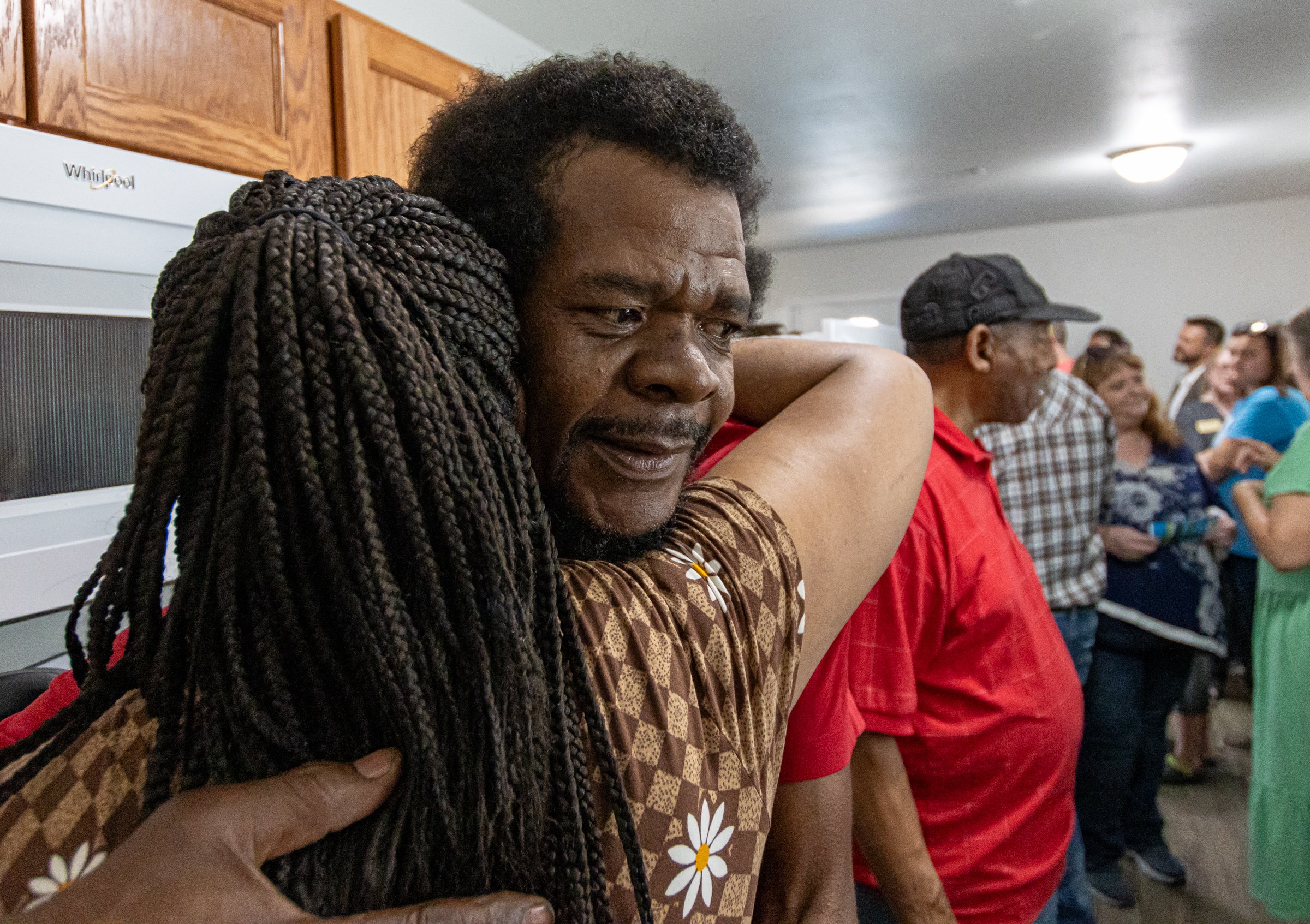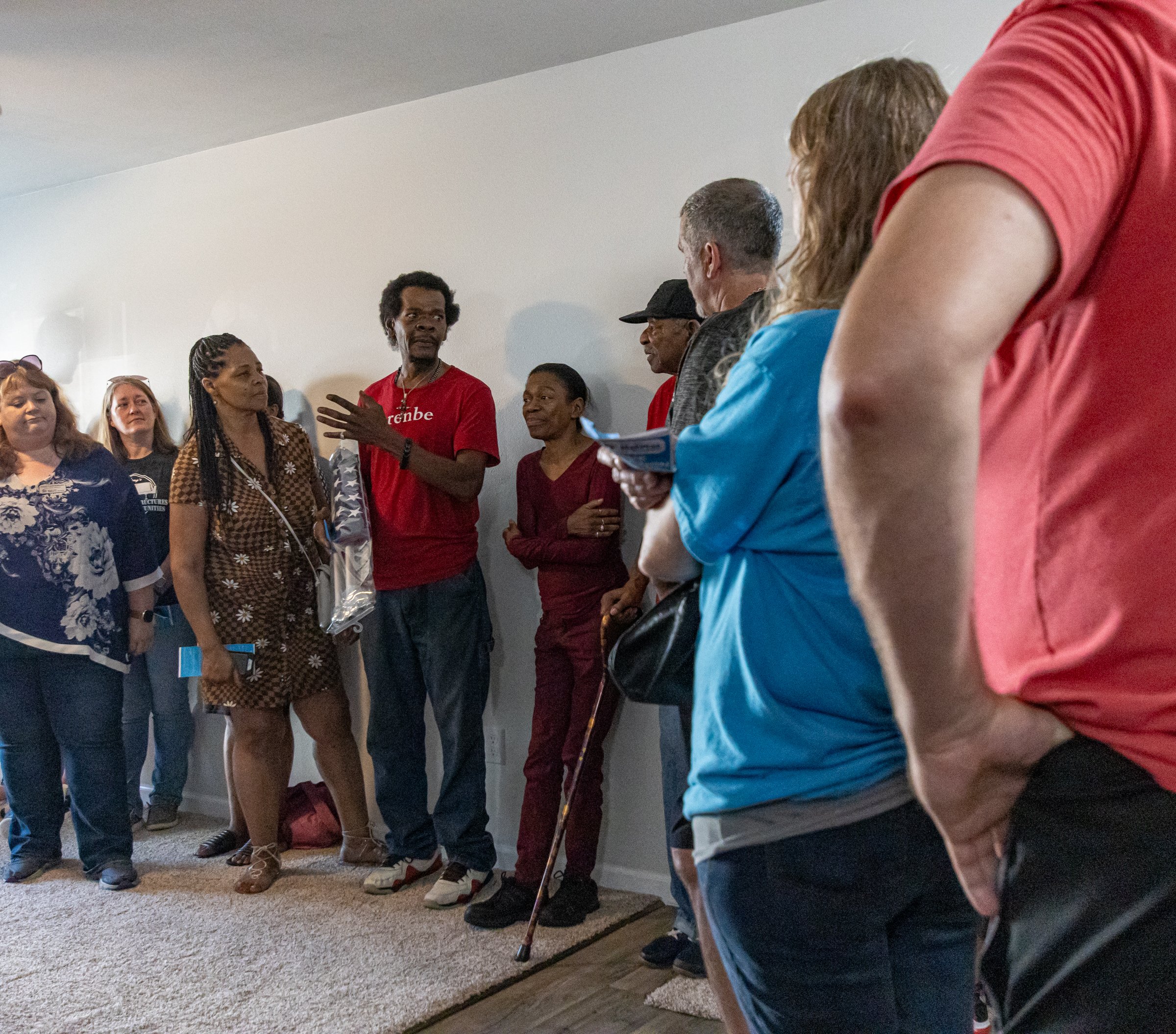Four years after a tornado tore down the roof of his house, Dwight Days is finally back home.
The River City Habitat for Humanity presented Days with the keys to his rebuilt Jefferson City home Wednesday evening at 500 E. Ashley St. When he took the keys from Susan Cook-Williams, the housing nonprofit’s executive director, Days kissed the keys and held them up high.
Days’ new home is a one-story house of 1,200 square feet with three bedrooms and two bathrooms, Habitat’s construction team member Mark Frey said. The house was built by volunteers from Habitat as the organization’s first Veterans Build project.
This new house is also significant for another reason. It is the final project managed by the Long-Term Recovery Committee (LTRC), which United Way of Central Missouri set up after the tornado that hit the area in 2019, former president of the local United Way Ann Bax said. The committee handled more than 600 cases since the natural disaster.
The committee helped pay part of the mortgage for this new house, which Habitat requires Days to buy with zero interest. United Way also helped furnish the new house, Bax said.
During the home dedication ceremony, several community organizations, such as the Zonta Club of Jefferson City, gave Days a variety of gifts, including groceries, a quilt, a national flag, a vacuum cleaner and a doormat.
Days was “elated” about his new house and all the resources he received, because it would have been much more expensive to buy back all the things he lost in the tornado, he said.
“That is a tremendous relief indeed,” he said.
Reverend Christine Gardner from Mount Vernon Missionary Baptist Church blessed the house in front of dozens of volunteers from Habitat, Veterans United, Catholic Charities and United Way, along with Days’ relatives.
“This is not even just a home, but this is his sanctuary,” Gardner said.
Habitat tore down the old house and began building a new one in January after Days entered the organization’s rebuilding program in 2022, Cook-Williams said. It has rebuilt eight other homes nearby after the tornado, she added.
Her organization build this house as a Veterans Build project because Days is an Army veteran. While veterans from Team Rubicon and Veterans United Home Loans assisted with construction, civilian volunteers from Habitat helped as well, Cook-Williams said.
Per Habitat requirement, Days participated in the building process as well. He helped put in the flooring and windows, in addition to building other Habitat projects.
“I’m an industrious-type person anyway,” he said. “This is right down my field.”
Apart from pitching in during construction and paying off the mortgage, Habitat asked Days to attend classes on home ownership, too, including a six-week budgeting class, as well as courses in home maintenance and wills and trust.
“We teach them anything we can think of to help them become successful,” Cook-Williams said.
The appraised value for the new house is about $165,000, Cook-Williams said. While the LTRC paid a portion of the mortgage, Veterans United also donated $50,000 to Habitat for building costs. Apart from Habitat’s ReStore, Quaker Windows & Doors and construction firm Classic Buildings also sponsored the new house, she added.
“Veterans United and the fundraising that we do helps get the project started, and then when homeowners make their payments, it goes back into the fund to help build (other projects),” Cook-Williams said.
For United Way, the completion of Days’ house signified the tornado was finally “in the rearview mirror,” Bax said, even though the community is “forever changed.”
With its final project over, the committee, which oversaw tornado victim cases, is now transitioning to a Community Organization Active in Disaster, she said. Such an organization is a community entity that coordinates basic human services during emergencies, according to a Missouri Department of Public Safety manual.
“Everybody will be prepared to stand ready in the case of another disaster,” Bax said.
Days and his siblings grew up in the original two-story house, which was built in the 1960s, he said. After the tornado blew the roof off, he was initially reluctant to get outside help. Instead, he hoped to fix the house up himself, wishing to build a deck at that time, he said.
Even though he was first victim of the tornado Bax saw after her father-in-law, Days refused help from other community organizations for a long time. For much of three years, he lived in harsh conditions to stay close to the ruined family home.
However, he finally went to live in an apartment from the Jefferson City Housing Authority after staying sober. Eventually, Kimberly Woodruff, Habitat’s volunteer coordinator and a childhood friend of Days’, convinced him to accept help from the organization.
Looking forward, Days hoped to continue volunteering for Habitat. On a more personal note, he would like to start a family, he said.
“I ain’t too old to adopt,” he said. “I guess some children out there … a lot of them do need help.”
Josh Cobb/News Tribune photo: Dwight Days hugs the president of the Jefferson City Area Board of Realtors, Blake Werner, after Werner gave Days a welcome mat during the dedication ceremony of Days home on Wednesday evening, July 26, 2023. Days lost his home when it was destroyed by the tornado that struck Jefferson City in 2019. Habitat for Humanity subsequently rebuilt his home.
 Josh Cobb/News Tribune photo: Dwight Days hugs his sister Pamela Coleman during the dedication ceremony of his home on Wednesday evening. Days lost his home when it was destroyed by the tornado that struck Jefferson City in 2019. Habitat for Humanity subsequently rebuilt his home.
Josh Cobb/News Tribune photo: Dwight Days hugs his sister Pamela Coleman during the dedication ceremony of his home on Wednesday evening. Days lost his home when it was destroyed by the tornado that struck Jefferson City in 2019. Habitat for Humanity subsequently rebuilt his home.
 Josh Cobb/News Tribune photo: Dwight Days (fourth from the right) speaks about his experience with Habitat for Humanity during the dedication ceremony of his home on Wednesday evening. Days lost his home when it was destroyed by the tornado that struck Jefferson City in 2019. Habitat for Humanity subsequently rebuilt his home. As a result Days says that he will be spending more of his time volunteering, and contributing to the community of Jefferson City.
Josh Cobb/News Tribune photo: Dwight Days (fourth from the right) speaks about his experience with Habitat for Humanity during the dedication ceremony of his home on Wednesday evening. Days lost his home when it was destroyed by the tornado that struck Jefferson City in 2019. Habitat for Humanity subsequently rebuilt his home. As a result Days says that he will be spending more of his time volunteering, and contributing to the community of Jefferson City.
